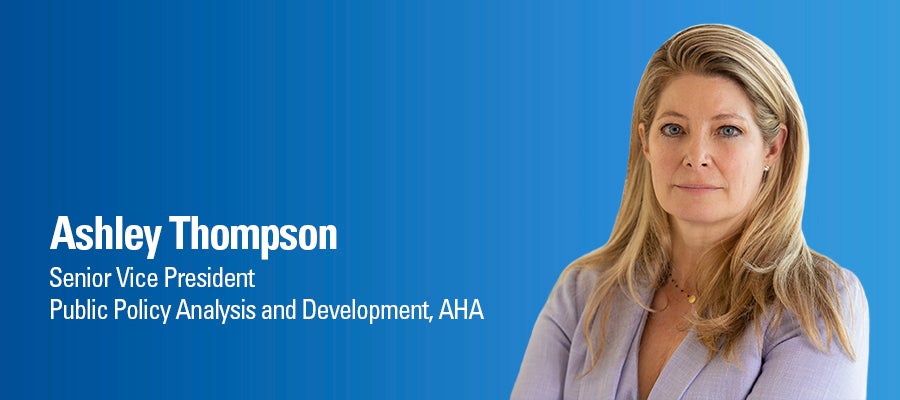Ashley Thompson
Senior Vice President, Public Policy Analysis and Development

Ashley Thompson is the Senior Vice President of Public Policy Analysis and Development at the American Hospital Association.

Ashley Thompson is the Senior Vice President of Public Policy Analysis and Development at the American Hospital Association.
Results from a new Dobson | DaVanzo study further support retaining the ban on new Physician-Owned Hospitals (POHs) and explain the damage of expanding POHs in rural communities.
Paragon Health Institute continues their series of misguided and harmful characterizations of Medicaid financing and provider payment.
For health care organizations that care for the 70 million Medicaid patients in the U.S., provider taxes are a life vest that keep state Medicaid programs afloat and allow them to continue providing critical health care services for their communities.
The AHA strongly believes that a skilled, caring workforce is integral to delivery of high quality, safe care. At the same time, safe staffing is about much more than a number. We are concerned that in proposing a one-size-fits-all numerical staffing threshold, CMS would remove the role of clinical judgment in staffing facilities, and inadvertently create patient access challenges across the health care system.
The editorial board of The Washington Post has published an opinion piece calling for payment cuts to hospitals and health systems as part of efforts to stabilize the Medicare program. The editorial calls for adopting so-called site-neutral payment policies, decreasing federal payments to teaching hospitals and reducing coverage of bad debt to 25%.
Earlier this month the Medicare Payment Advisory Commission (MedPAC) released its annual March report on the commission’s recommendations for Fiscal Year 2024 Medicare payment updates. Some recent media articles have lazily used the report to suggest that “hospitals’ financial situations are not nearly as dire as industry groups are making them out to be.”
Hospitals serving marginalized urban communities need additional federal support so they can meet their mission of advancing health for the patients and communities they serve.
A recent piece in The Hill promoting physician-owned hospitals gives a misleading and incomplete account of these facilities and the reasons for current statutory restrictions on their growth.
A recent study published in JAMA Health Forum (“Association Between COVID-19 Relief Funds and Hospital Characteristics in the U.S.”) that examines CARES Act Provider Relief Funds allocated to health care providers misses the point of those payments and makes arbitrary choices about which payments to include.
Come January 1, 2022, patients will be protected from certain types of unexpected medical bills. America’s hospitals and health systems strongly support these new patient protections that are included in the No Surprises Act.
